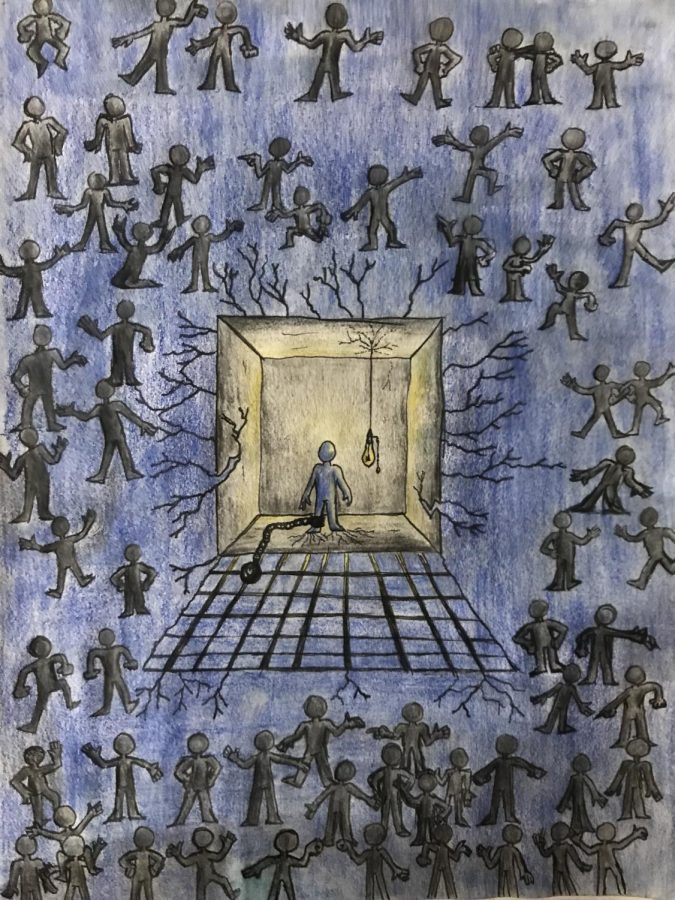The Enterprise Collection 2019
Day 1: Depression
May 8, 2019
Dear readers,
When the editors and I began discussing how to approach our enterprise series this year, one thing was made painstakingly obvious: the community and world which we inhabit made it impossible to limit ourselves to just one topic as we had in previous years.
That is why this year, in a departure from tradition, we have decided to give the dedicated reporters on our staff the opportunity to go and seek out the topics that they are passionate about, and give our readers detailed, in-depth coverage.
Each of the stories you see is the fruit of an effort by a dedicated duo of reporters who saw a topic they wanted to pursue, and went out to explore its intricacies. We hope each individual series can give you a more detailed look at a topic that affects people not only at Cambridge, but throughout the globe.
Thank you,
Cherise Kim
Editor-in-Chief of The Bear Witness
What is Depression?
A graphic design done by sophomore Isabel Conrath, in an artistic depiction of depression.
Depression: a mood disorder that causes consistent sadness, as well as loss of interest and happiness in day-to-day activities and events.
But depression is more than just a topic or a definition.
It’s a problem that has plagued millions of people for generations.
Depression is more than waking up sad one morning. It’s more than a mood swing. Depression is a persistent, diagnosable mental condition that is treated on a case-by-case basis.
Assistant Professor of Psychology at the University of Georgia Katherine Ehrlich said in an email that depression can be caused by a multitude of factors.
These include genes, stressful life experiences, school pressure and certain coping vulnerabilities, like poor coping mechanisms and a negative thought process, said Ehrlich.
Depression can lead to problems in the school, home and social life of a student, sometimes causing an even worse depressed state.
“It’s likely that these effects go both ways, but there’s pretty good consensus that depression leads to poor outcomes across academic and social functioning,” said Ehrlich.
The school’s AP Psychology teacher, Sarah Rhodes, said depression can often also cause a patient to only focus “on the bad things in life” and upsetting past memories.
“Depression can basically rewire your brain,” said Rhodes, “so that’s bad because it can rewire your [neural] networks to actually cause depression to either be more pronounced or to encourage a depressed episode.”
There are also certain aspects that can set off a depressive episode.
Therapist Amy Head from New Perspectives for Life, a therapy provider in Marietta said parents and caregivers should be aware of many common triggers, which differ between teens and adults.
“I definitely think they’re affected differently,” said Head. “Usually it involves self-esteem, where they are not thinking very highly of themselves,” she said about teens’ experiences with depression.
Common tendencies and symptoms can be sleeping a lot, lack of motivation, binge eating, seclusion, acting out (e.g. sneaking out, lying, doing drugs) and potentially self-harm.
However, depression is treatable. Medication, therapy and treatments can lead to the diminishment of depression from one’s life, or at least makes it more manageable.
According to Head, some commonly used techniques are breathing exercises, trying to find one’s self worth and driving out negative thoughts.
A largely known treatment is Cognitive Behavior Treatment, or CBT, a gradual system therapists use to get to know a patient.
“By me asking questions and learning about them and helping them see their strengths, we try to shift their perspectives,” said Head about the treatment.
Ehrlich says when one is going through treatment, it is important to continue self-care and a therapist for support.
“So if you are struggling with depression, it’s important to work with a care provider to find treatments that provide relief.”
Undiagnosed Claims of Depression: How Far is Too Far?
Today’s teenagers are known for their morbid and dark humor.
Disturbing jokes about the afterlife, death and self-harm are common — conversational attributes in the dialogues of the average teen.
But when does a joke go too far? When does it go from funny to scary? How does it go from a joke that would amuse to one that would offend?
You’ve probably heard jokes similar to this before, and you might hear them almost every day.
Over recent years, depression has become more concerning among teenagers.
According to the Newport Academy, a teen treatment center, diagnoses of depression in teenagers have increased by 63 percent since 2013.
Unfortunately, it’s hard to determine who truly has this mental illness today because of undiagnosed claims and jokes.
Katie Ehrlich, Assistant Professor of Psychology at the University of Georgia has the same opinion on how depression jokes are inappropriate.
“[It] can make individuals who suffer from depression feel that their experience is not taken seriously,” she said in an email.
Ehrlich added on, saying that diagnoses of depression should be made by medical professionals, and that people should not rely on their own determination.
Freshman Laura Watkins said the same thing, noting that people often confuse sadness and depression. She said sadness is more short term, whereas depression is a daily, prolonged and gloomy feeling.
She also finds it difficult to help people who joke about being depressed.
“Sometimes I wonder if they need someone to reach out to, but also I’m kinda like, ‘They’re just making a joke. It doesn’t do anything. I don’t know why you’re making jokes about that,’” she said.
“If anything, it just derails people who actually need help. You can’t find out who does.”
Watkins said because of the multitude of depression jokes nowadays, it’s confusing to tell if someone actually has depression. It could either simply be an insensitive joke or a “cry for help,” she said.
But why has society turned to humor regarding such a grave issue? Why do we use these jokes and comments to address our deepest, darkest feelings?
“I think depression jokes are so prominent because more people have depression now, and in this generation, memes and jokes are kind of how we express ourselves,” said sophomore Rachel Mason.
However, she thinks joking about the mental illness devalues its severity.
“I think people should get diagnosed before they say they have depression, because it delegitimizes people’s actual struggles if they don’t have it,” said Mason.
Watkins agrees, saying, “If everyone’s making jokes about it, then it kinda minimizes the actual thing.”
However, many believe this small trend can be fixed and addressed.
The Mayo Clinic, a non-profit medical educational center, said in an article, “An accurate diagnosis is the key to getting appropriate treatment.”
The clinic advises parents and guardians to speak to their pediatrician or family therapist and consider getting their child a proper diagnosis treatment before making further decisions.
Students like Mason believe there are should be conversations about the topic, and those conversations can help increase awareness of it.
“I think we can solve this by spreading awareness and encouraging people to be vulnerable and seek help if they have depression,” said Mason.
“In terms of avoiding damaging jokes, I think we need to open a conversation with people who actually have depression.”
Ehrlich also feels that people who have depression should seek assistance, and that people should always look for warning indications towards depressive behavior.
“It’s important for friends and family members to be aware of signs that someone might be struggling and find ways to help,” she said.


Halle Larson • Sep 8, 2019 at 10:47 am
SUCH a good article! Very important topic!